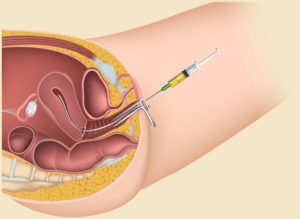
According to the WHO report about 2-10% of couples worldwide are unable to conceive primarily and about 60-80% couples in the world are infertile. It is estimated that 10% of normally fertile couples fail to conceive within their first year of attempt. Further 10-25% couples experience secondary infertility. Among these couples, causative factors are found about 30-40% in females and 10-30% in males. Genetic factors, changed lifestyle, increased stress and environmental pollution are identified as factors contributing to the rise of infertility.
Causes
All of the steps during ovulation and fertilization need to happen correctly in order to get pregnant. Sometimes the issues that cause infertility in couples are present at birth, and sometimes they develop later in life.
Infertility causes can affect one or both partners. In general:
- In about one-third of cases, there is an issue with the man
- In about one-third of cases, there is an issue with the woman
- In the remaining cases, there are issues with both the man and the woman, or no cause can be found
These may include:
- Abnormal sperm production or function due to undescended testicles, genetic defects, health problems such as diabetes, or infections such as chlamydia, gonorrhea, mumps or HIV. Enlarged veins in the testes (varicocele) also can affect the quality of sperm.
- Problems with the delivery of sperm due to sexual problems, such as premature ejaculation; certain genetic diseases, such as cystic fibrosis; structural problems, such as a blockage in the testicle; or damage or injury to the reproductive organs.
- Overexposure to certain environmental factors, such as pesticides and other chemicals, and radiation. Cigarette smoking, alcohol, marijuana, anabolic steroids, and taking medications to treat bacterial infections, high blood pressure and depression also can affect fertility. Frequent exposure to heat, such as in saunas or hot tubs, can raise body temperature and may affect sperm production.
- Damage related to cancer and its treatment, including radiation or chemotherapy. Treatment for cancer can impair sperm production, sometimes severely.
Causes of female infertility may include:
- Ovulation disorders, which affect the release of eggs from the ovaries. These include hormonal disorders such as polycystic ovary syndrome. Hyperprolactinemia, a condition in which you have too much prolactin — the hormone that stimulates breast milk production — also may interfere with ovulation. Either too much thyroid hormone (hyperthyroidism) or too little (hypothyroidism) can affect the menstrual cycle or cause infertility. Other underlying causes may include too much exercise, eating disorders or tumors.
- Uterine or cervical abnormalities, including abnormalities with the cervix, polyps in the uterus or the shape of the uterus. Noncancerous (benign) tumors in the uterine wall (uterine fibroids) may cause infertility by blocking the fallopian tubes or stopping a fertilized egg from implanting in the uterus.
- Fallopian tube damage or blockage, often caused by inflammation of the fallopian tube (salpingitis). This can result from pelvic inflammatory disease, which is usually caused by a sexually transmitted infection, endometriosis or adhesions.
- Endometriosis, which occurs when endometrial tissue grows outside of the uterus, may affect the function of the ovaries, uterus and fallopian tubes.
- Primary ovarian insufficiency (early menopause), when the ovaries stop working and menstruation ends before age 40. Although the cause is often unknown, certain factors are associated with early menopause, including immune system diseases, certain genetic conditions such as Turner syndrome or carriers of Fragile X syndrome, and radiation or chemotherapy treatment.
- Pelvic adhesions, bands of scar tissue that bind organs that can form after pelvic infection, appendicitis, endometriosis or abdominal or pelvic surgery.
- Cancer and its treatment. Certain cancers — particularly reproductive cancers — often impair female fertility. Both radiation and chemotherapy may affect fertility.
Many of the risk factors for both male and female infertility are the same. They include:
- Age. Women's fertility gradually declines with age, especially in the mid-30s, and it drops rapidly after age 37. Infertility in older women is likely due to the lower number and quality of eggs, and can also be due to health problems that affect fertility. Men over age 40 may be less fertile than younger men.
- Tobacco use. Smoking tobacco or marijuana by either partner may reduce the likelihood of pregnancy. Smoking also reduces the possible effectiveness of fertility treatment. Miscarriages are more frequent in women who smoke. Smoking can increase the risk of erectile dysfunction and a low sperm count in men.
- Alcohol use. For women, there's no safe level of alcohol use during conception or pregnancy. Alcohol use may contribute to infertility. For men, heavy alcohol use can decrease sperm count and motility.
- Being overweight. Among American women, an inactive lifestyle and being overweight may increase the risk of infertility. For men, sperm count also may be affected by being overweight.
- Being underweight. Women at risk of fertility problems include those with eating disorders, such as anorexia or bulimia, and those who follow a very low-calorie or restrictive diet.
- Exercise issues. A lack of exercise contributes to obesity, which increases the risk of infertility. Less often, ovulation problems may be associated with frequent strenuous, intense exercise in women who are not overweight.
Ayurveda Perspective & Management of Infertility

Ayurveda consider this problem as a cause of deterioration of quality of four factors i.e., time of ovulation, female health in context of reproductive system, quality of sperm and ovum and females proper nutrition.
According to Ayurvedic classics female infertility is failure achieve a child rather than pregnancy as Garbha srava and Mrutvatsa is also included in type of infertility.
Vajikarana is one of the eight branches of Ayurveda which specifically deals with the Shukra dhatu (semen & ovum) and sexual potencification to have healthier progeny.
Main Ayurvedic treatment goals are
- Purification
- Functional optimization of reproductive tissues (arthava- and shukra-dhatu) of both sexes
According to Ayurveda, reproductive health is primarily determined by the health of tissue metabolism and tissue nutrition, both being ultimate requirements for conception.
The unique feature of the Ayurvedic approach to fertility is that it emphasizes improving the overall health of the prospective parents. Fertility therefore may ensue partly due to improved overall health.
At CHARAKA, we provide a very effective, holistic and wide range of treatment modalities for infertility based on classical principles of Ayurveda literature. Hundreds of formulations, herbs and recipes, variety of Panchakarma and rejuvenation therapies are advocated to achieve fertility.
The treatment of Infertility comprises of administration of rasayana and vajikara dravyas or medicines (virilificatory or aphrodisiacs) internally, Panchakarma & Vajikarana therapies for detoxification and rejuvenation of reproductive system.
Apart from regular Panchakarma procedures, Uttara vasti is a special & highly acclaimed procedure in Ayurveda to treat Infertility. It is introduction of medicate oil or decoction into the uterus in females through the cervix in females and into the bladder through urethra in males.
The Garbha sanskara is a special program offered at CHARAKA for the couples planning for the pregnancy. It comprises of three stages: such as preconception (Beeja sanskar), duration of pregnancy (Garbhasanskar) and post delivery (Soothika & Bala sanskar).
Along with these, diet and lifestyle modifications are also advocated which will not only help in better conception but also in producing healthy offspring.

